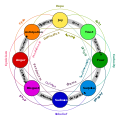General
The first documented use of "emotional blackmail" appeared in 1947 in the Journal of the National Association of Deans of Women in the article "Discipline and Group Psychology". The term was used to describe one type of problematic classroom control model often used by teachers. [2] Esther Vilar, an Argentine physician and anti-feminist writer, also used the term "emotional blackmail" in the early 1970s to describe a parenting strategy observed among some mothers with multiple children. [3]
Emotional blackmail typically involves two people who have established a close personal or intimate relationship (parent and child, spouses, siblings, or two close friends). [4] Children, too, will employ special pleading and emotional blackmail to promote their own interests, and self-development, within the family system. [5]
Emotional blackmailers use fear, obligation and guilt in their relationships, ensuring that others feel afraid to cross them, obligated to give them their way and swamped by guilt if they resist. Knowing that someone close to them wants love, approval or confirmation of identity and self-esteem, blackmailers may threaten to withhold them (e.g., withhold love) or take them away altogether, making the second person feel they must earn them by agreement. [6] Fear, obligation or guilt is commonly referred to as "FOG". FOG is a contrived acronym—a play on the word "fog" which describes something that obscures and confuses a situation or someone's thought processes.
The person who is acting in a controlling way often wants something from the other person that is legitimate to want. They may want to feel loved, safe, valuable, appreciated, supported, needed, etc. This is not the problem. The problem is often more a matter of how they are going about getting what they want, or that they are insensitive to others' needs in doing so, and how others react to all of this. [1]
Under pressure, one may become a sort of hostage, forced to act under pressure of the threat of responsibility for the other's breakdown. [7] One could fall into a pattern of letting the blackmailer control his/her decisions and behavior, lost in what Doris Lessing described as "a sort of psychological fog". [8]
Emotional blackmail is a punishment that can take place in romantic relationships. For instance, in an unpleasant divorce, the emotional blackmailer might warn that if their spouse files for divorce, they would retain the financial assets or never allow them to interact with the children. Such actions might make the victim angry as they feel they are being controlled and unable to react in a healthy way. [9]
Patterns and characteristics
Addictions
Addicts often believe that being in control is how to achieve success and happiness in life. People who follow this rule use it as a survival skill, having usually learned it in childhood. As long as they make the rules, no one can back them into a corner with their feelings. [11]
Codependency
Codependency often involves placing a lower priority on one's own needs, while being excessively preoccupied with the needs of others. Codependency can occur in any type of relationship, including family, work, friendship, and also romantic, peer or community relationships. [16]
Affluenza and children
Affluenza—the status insecurity derived from obsessively keeping up with the Joneses—has been linked by Oliver James to a pattern of childhood training whereby sufferers were "subjected to a form of emotional blackmail as toddlers. Their mothers' love becomes conditional on exhibiting behaviour that achieved parental goals." [17]
Assertiveness training
Assertiveness training encourages people to not engage in fruitless back-and-forths or power struggles with the emotional blackmailer but instead to repeat a neutral statement, such as "I can see how you feel that way," or, if pressured to eat, say "No thank you, I'm not hungry." They are taught to keep their statements within certain boundaries in order not to capitulate to coercive nagging, emotional blackmail, or bullying. [18]
Recovery
Techniques for resisting emotional blackmail include strengthening personal boundaries, resisting demands, developing a power statement —the determination to stand the pressure—and buying time to break old patterns. Re-connecting with the autonomous parts of the self the blackmailer had over-ruled is not necessarily easy. [10] One may feel guilty based on emotional blackmail, even while recognizing the guilt as induced and irrational; [19] but still be able to resist overcompensating, and ignore the blackmailer's attempt to gain attention by way of having a tantrum. [20]
Consistently ignoring the manipulation in a friendly way may however lead to its intensification, and threats of separation, [21] or to accusations of being "crazy" or a "home wrecker". [10]
This page is based on this
Wikipedia article Text is available under the
CC BY-SA 4.0 license; additional terms may apply.
Images, videos and audio are available under their respective licenses.

